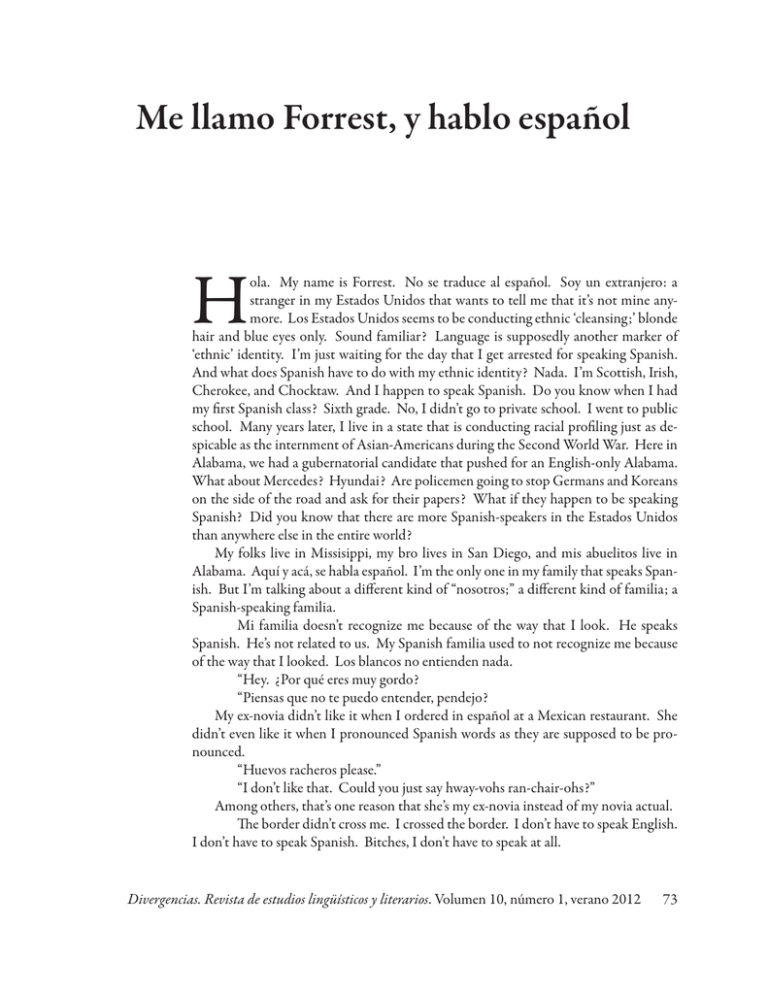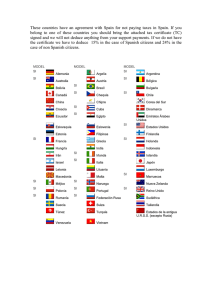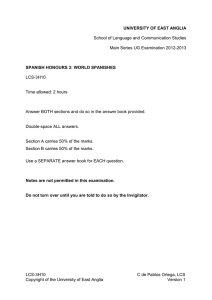Me llamo Forrest, y hablo español - Divergencias
Anuncio

Me llamo Forrest, y hablo español H ola. My name is Forrest. No se traduce al español. Soy un extranjero: a stranger in my Estados Unidos that wants to tell me that it’s not mine anymore. Los Estados Unidos seems to be conducting ethnic ‘cleansing;’ blonde hair and blue eyes only. Sound familiar? Language is supposedly another marker of ‘ethnic’ identity. I’m just waiting for the day that I get arrested for speaking Spanish. And what does Spanish have to do with my ethnic identity? Nada. I’m Scottish, Irish, Cherokee, and Chocktaw. And I happen to speak Spanish. Do you know when I had my first Spanish class? Sixth grade. No, I didn’t go to private school. I went to public school. Many years later, I live in a state that is conducting racial profiling just as despicable as the internment of Asian-Americans during the Second World War. Here in Alabama, we had a gubernatorial candidate that pushed for an English-only Alabama. What about Mercedes? Hyundai? Are policemen going to stop Germans and Koreans on the side of the road and ask for their papers? What if they happen to be speaking Spanish? Did you know that there are more Spanish-speakers in the Estados Unidos than anywhere else in the entire world? My folks live in Missisippi, my bro lives in San Diego, and mis abuelitos live in Alabama. Aquí y acá, se habla español. I’m the only one in my family that speaks Spanish. But I’m talking about a different kind of “nosotros;” a different kind of familia; a Spanish-speaking familia. Mi familia doesn’t recognize me because of the way that I look. He speaks Spanish. He’s not related to us. My Spanish familia used to not recognize me because of the way that I looked. Los blancos no entienden nada. “Hey. ¿Por qué eres muy gordo? “Piensas que no te puedo entender, pendejo? My ex-novia didn’t like it when I ordered in español at a Mexican restaurant. She didn’t even like it when I pronounced Spanish words as they are supposed to be pronounced. “Huevos racheros please.” “I don’t like that. Could you just say hway-vohs ran-chair-ohs?” Among others, that’s one reason that she’s my ex-novia instead of my novia actual. The border didn’t cross me. I crossed the border. I don’t have to speak English. I don’t have to speak Spanish. Bitches, I don’t have to speak at all. Divergencias. Revista de estudios lingüísticos y literarios. Volumen 10, número 1, verano 2012 73 Divergencias. Revista de estudios lingüísticos y literarios. Volumen 610 número 1, verano 2012 Hear, skeptical, angry, enthusiastic listeners and watchers, the first amendment to the constitution of the Estados Unidos: “El congreso no puede crear ninguna ley que prohíbe la libertad de expresión.” Jealousy, jealousy. Should those that can’t paint forbid those that can just because painters are in the minority? Just because there are so many more non-painters in the world? What about the singers? The writers? No entiendo el idioma de Lady Gaga, but she rocks. Some people like her, and others think she just makes noise. But in the Estados Unidos, ‘they’ let her do her thing. “Mantenemos estas verdades evidentes, que todos los seres humanos se crean iguales.” Latinos, Norteamericanos, hispanohablantes y anglohablantes. A commitment to hostility in the Estados Unidos has ended the lives of many people that possess a commitment to freedom and equality; por ejemplo, John F. Kennedy and Martin Luther King Junior, who had a dream outside of the violent confines of the supposed pax americana—Yeah, that’s Latin. Did they kill JFK because he used two words in Latin in a speech? I believe that JFK was Irish-Catholic, but I guess he was a Latino as well since he knew and used Latin, right? George Wallace made quite an infamous speech during the Movimiento. Over time, we learn from those that have a positive vision of humanity and hopefully reject everything else. He said on the campus of The University of Alabama, “Segregation now, segregation tomorrow, and segregation forever.” Hijo de la chingada, Where in the coñazo do you get this mierda? I’m not running for Governor. But I say “Segregation ayer, segregation anteayer, and Freedom today y para siempre. Forrest Blackbourn The University of Alabama Comentario Este relato describe las dificultades lingüísticas y cultures de la gente habla hispana. El narrador habla español, pero desde que es diferente de la apariencia típicamente latina, no se siente aceptado en ningún grupo cultural. Ha perdido su identidad cultural; pertenece a varios grupos culturales y no es aceptado por ningún grupo cultural simultáneamente. El uso del Spanglish en este relato hace hincapié en este aspecto. Cuando trata de hablar español correctamente en el restaurante mexicano, su ex-novia no puede aceptar la doble identidad lingüística y cultural de su novio. Aunque los Estados Unidos sea un país “democrático” y la constitución garantice la igualdad de todas razas, el narrador encuentra muchas injusticias por su doble identidad. Al final de todo, el narrador enfatiza que él selecciona su propia identidad lingüística: “I don’t have to speak English. I don’t have to speak Spanish. Bitches, I don’t have to speak at all.” Brian G. Hibbs The University of Arizona 74






